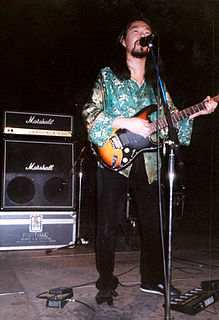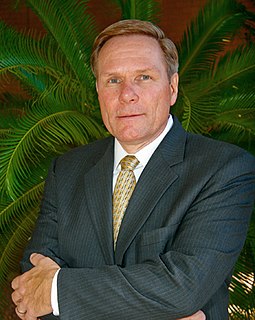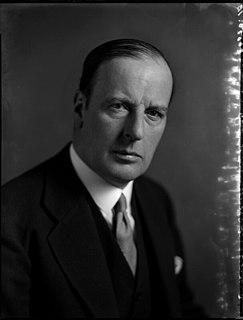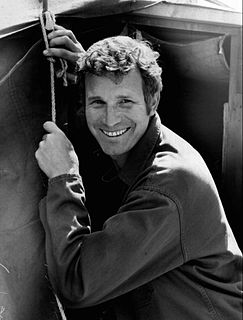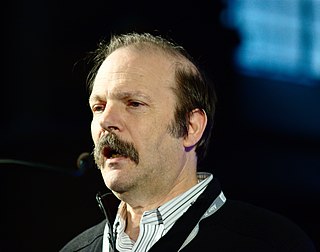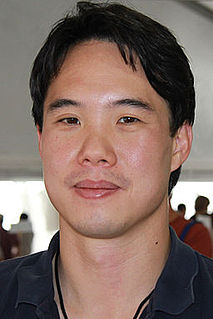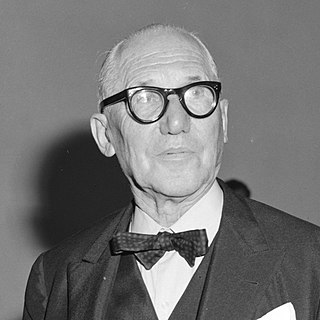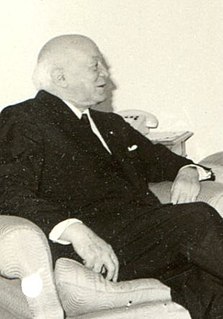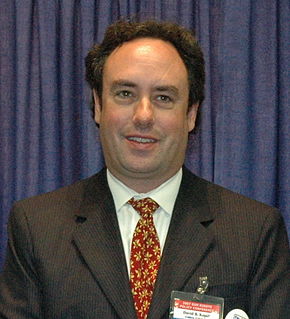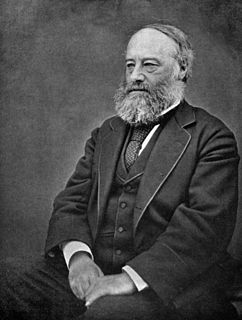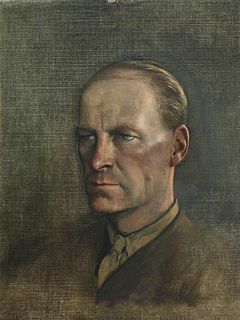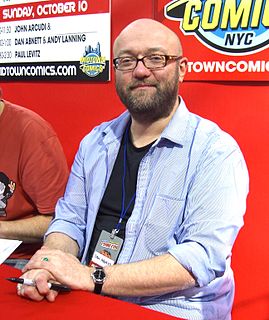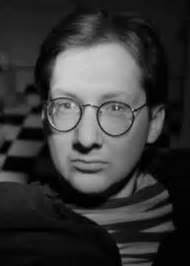Top 1200 Machine Quotes & Sayings - Page 5
Explore popular Machine quotes.
Last updated on April 16, 2025.
Physiologically, man in the normal use of technology (or his variously extended body) is perpetually modified by it and in turn finds ever new ways of modifying his technology. Man becomes, as it were, the sex organs of the machine world, as the bee of the plant world, enabling it to fecundate and to evolve ever new forms. The machine world reciprocates man's love by expediting his wishes and desires, namely, in providing him with wealth.
We are too much in the machine world today. Even here in Tuva we've got every year more and more cars and other technologies, and of course it brings more pollution to our air, to nature. And I think the idea of the Kraftwerk song is people should not be very much mechanized or to be a machine in the world of machines. The idea is to try to find a golden middle between the world of nature and the world of machines.
Not far from here, by a white sun, behind a green star, lived the Steelypips, illustrious, industrious, and they hadn't a care: no spats in their vats, no rules, no schools, no gloom, no evil influence of the moon, no trouble from matter or antimatter - for they had a machine, a dream of a machine, with springs and gears and perfect in every respect. And they lived with it, and on it, and under it, and inside it, for it was all they had - first they saved up all their atoms, then they put them all together, and if one didn't fit, why they chipped at it a bit, and everything was just fine.
Thus, be it understood, to demonstrate a theorem, it is neither necessary nor even advantageous to know what it means. The geometer might be replaced by the "logic piano" imagined by Stanley Jevons; or, if you choose, a machine might be imagined where the assumptions were put in at one end, while the theorems came out at the other, like the legendary Chicago machine where the pigs go in alive and come out transformed into hams and sausages. No more than these machines need the mathematician know what he does.
Although humans today remain more capable than machines for many tasks, by 2030 machine capabilities will have increased to the point that humans will have become the weakest component in a wide array of systems and processes. Humans and machines will need to become far more closely coupled, through improved human-machine interfaces and by direct augmentation of human performance
There is no conflict between the ideal of religion and the ideal of science, but science is opposed to theological dogmas because science is founded on fact. To me, the universe is simply a great machine which never came into being and never will end. The human being is no exception to the natural order. Man, like the universe, is a machine.
You know, and I know, the cause of this accident. It is due to the adventurous, pioneering spirit of our race. It has been like in the past, it is like that in the present, and I hope it will be in the future. Here is a great imaginative project, to build a machine with twice the speed and twice the height of any existing machine in the world. We all went into it with our eyes wide open. We were conscious of the dangers that were lurking in the unknown. We did not know what fate was going to hold out for us in the future.
I didn't feel like reading that night, so I went downstairs and watched a half-hour long commercial that advertised an exercise machine. They kept flashing a 1-800 number, so I called it. The woman who picked up the other end of the phone was named Michelle. And I told Michelle that I was a kid and did not need an exercise machine, but I hoped she was having a good night. That's when Michelle hung up on me. And I didn't mind a bit.
Since there is no one else to praise me, I will praise myself -- will say that I have never tampered with a single tooth in my thought machine, such as it is. There are teeth missing, God knows -- some I was born without, teeth that will never grow. And other teeth have been stripped by the clutchless shifts of history -- But never have I willfully destroyed a tooth on a gear of my thinking machine. Never have I said to myself, 'This fact I can do without.
All experiments that are related to the games when you have humans versus machines in the games - whether it's chess or "Go" or any other game - machines will prevail not because they can solve the game. Chess is mathematically unsolvable. But at the end of the day, the machine doesn't have to solve the game. The machine has to win the game. And to win the game, it just has to make fewer mistakes than humans. Which is not that difficult since humans are humans and vulnerable, and we don't have the same steady hand as the computer.
In the future it's very possible you could have an artificial intelligence system that can run the country better than a human being. Because human beings are naturally selfish. Human beings are naturally after their own interests. We are geared towards pursuing our own desires, but oftentimes, those desires have contrasts to the benefit of society, at large, or against the benefit of the greater good. Whereas, if you have a machine, you will be able to program that machine to, hopefully, benefit the greatest good, and really go after that.
Each new machine or technique, in a sense, changes all existing machines and techniques, by permitting us to put them together into new combinations. The number of possible combinations rises exponentially as the number of new machines or techniques rises arithmetically. Indeed, each new combination may, itself, be regarded as a new super-machine.
I've always loved fairy tales. I think they perhaps led me to theater rather than the other way around. As a child I wanted to invent a machine that could record my dreams, so I could watch them in the morning; or hire someone to draw the things I had in my head, because I knew I didn't have the skill to do it myself. Theater is that machine. I can make these images come to life and actually walk around inside them for a while.
Destiny was a machine built over time, each choice that you made in life adding another gear, another conveyor belt, another assemblyman. Where you ended up was the product that was spit out at the end—and there was no going back for a redo. You couldn?t take a peek at what you?d manufactured and decide, Oh, wait, I wanted to make sewing machines instead of machine guns; let me go back to the beginning and start again. One shot. That was all you got.
Some people seem to believe that for each problem there is a solution readily available - a solution that can be promptly achieved by passing a law and voting some money. I think of this as the vending machine concept of social change. Put a coin in the machine and out comes a piece of candy. If there is a social problem, pass a law and out comes a solution.
The Jemaine [Clement] and Taika works is a very long and slow machine - we put an idea in one end, and it takes about six years to come out the other end. And sometimes it doesn't even come out. And sometimes it comes out as a different idea. So we've out the idea of We're Wolves into the machine, and it's now slowly going through the sausage maker.
Alienation as we find it in modern society is almost total… Man has created a world of man-made things as it never existed before. He has constructed a complicated social machine to administer the technical machine he built. The more powerful and gigantic the forces are which he unleashes, the more powerless he feels himself as a human being. He is owned by his creations, and has lost ownership of himself.
There is a risk of death associated with donating a piece of liver. It's about one in 500 for the risk of death. The risk of death of donating a kidney is about one in 3000, so this is a riskier operation than donating a kidney. The stakes are usually higher for the recipient of the transplant because unlike kidney failure, where you have a dialysis machine, in liver failure we don't have that kind of machine that allows a patient to survive until they can get a cadaver organ.
Pet the cat dude," says Sam. "She brought you a present. She wants you to tell her how badass she is." "You are a tiny tiny killing machine." Daneca coos. "What's she doing?" I ask. "Purring!" says Daneca. She sounds delighted. "Good kitty. Who's an amazing killing machine? That's right. You are! You are a brutal brutal tiny lion! Yes, you are.
God says, "Come out of her my people, that you be not partakers of her sins and her plagues, for her sins have reached unto heaven." We don't need the Democratic Party. We don't need the Republican Party. We can get a little from both of them, but Elijah Muhammad said we need to form our own political machine.! A machine that works for the oppressed: The oppressed Black, Brown, Red, Yellow, White.
I am absolutely sick unto death of hearing people say - they all say this; it must be Item One on the curriculum in Trend College - "I just hate to talk to a machine!" They say this as though it is a major philosophical position, as opposed to a description of a minor neurosis. My feeling is, if you have a problem like this, you shouldn't go around trumpeting it; you should stay home and practice talking to a machine you can feel comfortable with, such as your Water Pik, until you are ready to assume your place in modern society.
He was asking too many questions and he was asking them too quickly. They were stacking up in my head like loaves in the factory where Uncle Terry works. The factory is a bakery and he operates the slicing machines. And sometimes a slicer is not working fast enough but the bread keeps coming and there is a blockage. I sometimes think of my mind as a machine, but not always as a bread-slicing machine. It makes it easier to explain to other people what is going on inside it.
The ethical rule is from Samuel Johnson who believed that maintenance of easily removable ignorance by a responsible office holder was treacherous malfeasance in meeting moral obligation. The prudential rule is that underlying the old Warner & Swasey advertisement for machine tools: "The man who needs a new machine tool, and hasn't bought it, is already paying for it". The Warner & Swasey rule also applies, I believe, to thinking tools. If you don't have the right thinking tools, you, and the people you seek to help, are already suffering from your easily removable ignorance.
I am trying to get the hang of this new fangled writing machine, but I am not making a shining success of it. However, this is the first attempt I have ever made & yet I perceive I shall soon & easily acquire a fine facility in its use. ... The machine has several virtues. I believe it will print faster than I can write. One may lean back in his chair & work it. It piles an awful stack of words on one page. It don't muss things or scatter ink blots around. Of course it saves paper.
One way to determine if a view is inadequate is to check its consequences in particular cases, sometimes extreme ones, but if someone always decided what the result should be in any case by applying the given view itself, this would preclude discovering it did not correctly fit the case. Readers who hold they would plug in to the machine should notice whether their first impulse was not to do so, followed later by the thought that since only experiences could matter, the machine would be all right after all.
National law has no place in cyberlaw. Where is cyberspace? If you don't like banking laws in the United States, set up your machine on the Grand Cayman Islands. Don't like the copyright laws in the United States? Set up your machine in China. Cyberlaw is global law, which is not going to be easy to handle, since we seemingly cannot even agree on world trade of automobile parts.
Suppose there were an experience machine that would give you any experience you desired. Superduper neuropsychologists could stimulate your brain so that you would think and feel you were writing a great novel, or making a friend, or reading an interesting book. All the time you would be floating in a tank, with electrodes attached to your brain. Should you plug into this machine for life, preprogramming your life experiences?...Of course, while in the tank you won't know that you're there; you'll think that it's all actually happening...Would you plug in?
We were doing something called telemedicine, where we were using the ultrasound. One interesting application of this ultrasound is the possibility that you could possibly use it to measure critical bone areas during a long space mission and track if you're losing bone in these areas. On Earth, when they check you for bone loss, you get in this big machine. It's the size of a room and it's got a platform with an x-ray that scans your whole body and in critical areas and it takes a while and it just wouldn't be practical to have a machine like that in space.
Every thing, even the so-called timesaving device and energy-efficient machine, comes these days with an elaborate set of instructions for its care and feeding. Buying a machine has become more and more like buying a pet. ... We are time-crunched. Not just by the number of things we have to do, but the number of things we have. In the late twentieth century, things have become our new dependents.
These airplanes we have today are no more than a perfection of a toy made of paper children use to play with. My opinion is we should search for a completely different flying machine, based on other flying principles. I consider the aircraft of the future, that which will take off vertically, fly as usual and land vertically. This flying machine should have no parts in movement. The idea came from the huge power of the cyclons
Some of the worst abuses of government force in recent years were precipitated by technical and victimless gun-law violations. For example, the BATF claimed that the Branch Davidians possessed machine guns without paying the required federal tax and filling in the proper registration forms. So a tax case worth less than $10,000 led to a 76-man helicopter, machine gun, and grenade assault on a home in which 2/3 of the occupants were women and children.
The most convincing proof of the conversion of heat into living force [vis viva] has been derived from my experiments with the electro-magnetic engine, a machine composed of magnets and bars of iron set in motion by an electrical battery. I have proved by actual experiment that, in exact proportion to the force with which this machine works, heat is abstracted from the electrical battery. You see, therefore, that living force may be converted into heat, and that heat may be converted into living force, or its equivalent attraction through space.
Being on a film set is like being in tech forever. In theater, when you finally finish rehearsing, you go onstage and you do the lights and the sets and you make the machine of the production work. It takes usually about ten days in the theater, two or three weeks if it's a really big musical. I mean, it's hell on earth. You just sit around forever while they adjust the lights. And every playwright with half a brain runs for the hills when tech starts because it's so boring, and you don't want to talk to the director because the director is running this giant machine.
There's all these people involved, and it becomes this huge machine - it stops being just me making my own little songs for myself, or for the world. And it's hard to stop the machine. If you want to take time to write a record, they're like, "OK, tour through March, April, and June, then you can take a few weeks off to record in July before getting back on the road for the European festival circuit." After a while, I had to put my foot down.
Architects in urban planning are talking about this but they're not talking about it yet I don't think at that level that [Buckminster] Fuller is talking about when he talked about putting a dome over Manhattan, which is to say an attempt at integrating all of these different technologies in a way that makes for a city that, without having an actual dome, thermodynamically manages the heat flow for that urban environment and therefore makes it so that it is a highly efficient machine for a living or a dwelling machine as he would have preferred in terms of thermodynamically optimizing it.
Science can give us only the tools in the box, these mechanical miracles that it has already given us. But of what use to us are miraculous tools until we have mastered the humane, cultural use of them? We do not want to live in a world where the machine has mastered the man; we want to live in a world where man has mastered the machine.
Maybe belief is the biggest lie. In ages past, the earliest philosophers tried to explain the stars in the sky and the world around them. One of them conceived of the notion that the universe was mounted on giant crystal spheres controlled by a giant machine, which explained the movements of the heavens. He was laughed at and told that such a machine would be so huge and noisy that everyone would hear it. He simply replied that we are born with that noise all around us, and that we are so used to hearing it that we cannot hear it at all.
When we mistake what we can know for all there is to know, a healthy appreciation of one's ignorance in the face of a mystery like soil fertility gives way to the hubris that we can treat nature as a machine. Once that leap has been made, one input follows another, so that when the synthetic nitrogen fed to plants makes them more attractive to insects and vulnerable to disease, as we have discovered, the farmer turns to chemical pesticides to fix his broken machine.
Constitutional rights are useful up to a point, but they do not serve to guarantee much more than what could be called the bourgeois conception of freedom. According to the bourgeois conception, a "free" man is essentially an element of a social machine and has only a certain set of prescribed and delimited freedoms; freedoms that are designed to serve the needs of the social machine more than those of the individual.
I came out for exercise, gentle exercise, and to notice the scenery and to botanise. And no sooner do I get on that accursed machine than off I go hammer and tongs; I never look to right or left, never notice a flower, never see a view - get hot, juicy, red - like a grilled chop. Get me on that machine and I have to go. I go scorching along the road, and cursing aloud at myself for doing it.
Oho, now I know what you are. You are an advocate of Useful Knowledge.... Well, allow me to introduce myself to you as an advocate of Ornamental Knowledge. You like the mind to be a neat machine, equipped to work efficiently, if narrowly, and with no extra bits or useless parts. I like the mind to be a dustbin of scraps of brilliant fabric, odd gems, worthless but fascinating curiosities, tinsel, quaint bits of carving, and a reasonable amount of healthy dirt. Shake the machine and it goes out of order; shake the dustbin and it adjusts itself beautifully to its new position.

